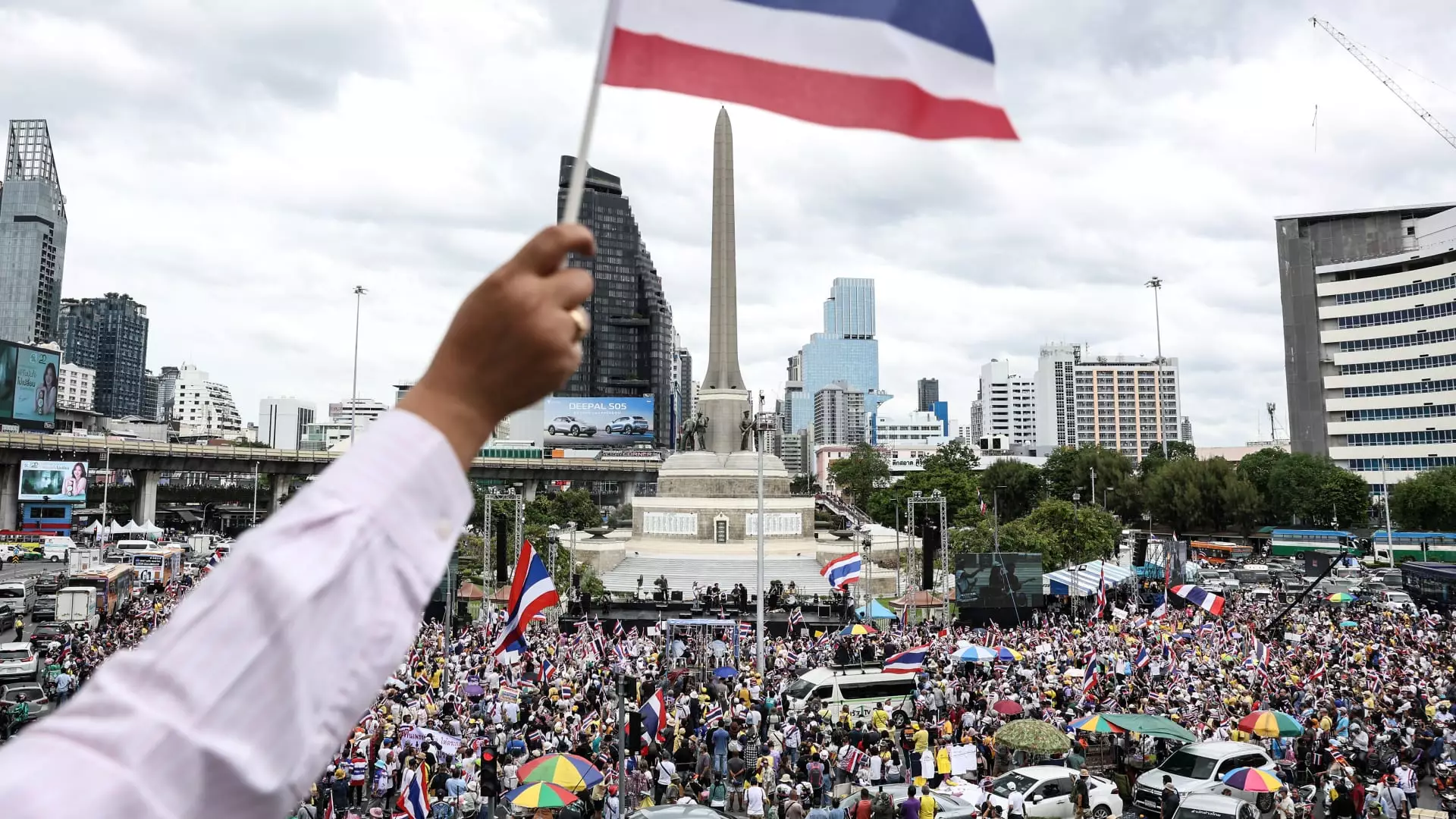Thailand is once again teetering on the edge of political upheaval, with Prime Minister Paetongtarn Shinawatra’s government under unprecedented strain. The recent mass demonstration in Bangkok, fueled by nationalist outrage, signals a deeper malaise that goes beyond a simple border disagreement with Cambodia. Hundreds gathered near Victory Monument—a potent symbol of Thai military pride—to demand Paetongtarn’s resignation, reflecting a profound discontent that transcends ordinary political dissent. This protest, orchestrated by a coalition known for their nationalist activism, is reminiscent of the tumultuous decades past, when the Shinawatra family’s grip on power was repeatedly challenged by military coups and judicial maneuvers.
The resurgence of nationalist fervor in this protest isn’t accidental. It’s a strategic mobilization aimed at undermining a government already weakened by economic turmoil and internal coalition fractures. Paetongtarn, who inherited not just a premiership but a legacy fraught with divisive politics, now faces the daunting reality that her slim majority in parliament could evaporate amid heightened scrutiny—potentially inviting a no-confidence vote that might topple her administration.
The Intersection of Diplomacy and Domestic Backlash
The catalyst behind the current turmoil was a leaked phone call between Paetongtarn and Cambodia’s controversial former leader, Hun Sen. In an attempt to ease tensions, Paetongtarn’s verbal criticism of a Thai military commander proved politically disastrous—exposing the complicated relationship between civilian government and military influence in Thailand. The military’s entrenched power means that such remarks are not mere diplomatic missteps but direct affronts to an institution that has historically shaped Thailand’s political landscape through coups and behind-the-scenes pressure.
Paetongtarn’s apology does little to quell the firestorm, illustrating the tightrope she must walk between international diplomacy and domestic political sensibilities. It also reveals the fragility of her coalition; the recent exit of the Bhumjaithai Party over concerns of national sovereignty amidst this scandal underscores how easily alliances fracture when nationalist sentiments flare. The fact that military-aligned forces still hold such sway over civilian government decisions is a troubling sign of democratic backsliding masked under the guise of stability.
Judiciary as a Political Weapon
Adding another layer of complexity, Paetongtarn now faces judicial scrutiny following complaints lodged against her conduct in the phone call incident. The threats from the Constitutional Court and the anti-graft agency loom large, serving as potent instruments potentially leading to her forced removal. This judicial activism reflects a broader pattern in Thai politics, where legal mechanisms have repeatedly been employed to sideline elected leaders—often undermining the popular will.
Rather than fostering genuine accountability, this process risks perpetuating a cycle of political instability wherein elected governments are persistently vulnerable to extra-parliamentary actors. The unresolved tension between upholding democratic mandates and managing military and judicial power remains a central crisis for Thailand’s political evolution—a problem that Paetongtarn’s administration has so far been unable to effectively address.
Regional Rivalries and Personal Vendettas
Hun Sen’s unprecedented public denunciation of Paetongtarn and her family deepens the crisis, intertwining regional rivalries with personal political vendettas. His incendiary speech, calling for a regime change in Thailand, breaks diplomatic norms and intensifies the bilateral dispute beyond what is traditionally expected from neighboring states. While Thailand’s foreign ministry maintains a commitment to diplomacy, this episode starkly illustrates how past alliances have transformed into bitter antagonisms, dragging internal Thai politics into regional conflicts.
The Shinawatra family’s longstanding entanglement in cross-border politics once provided strategic leverage but now serves as a dangerous liability, exposing Thailand to external influence and internal divisiveness. Navigating this maze requires much more than crisis management; it demands a comprehensive rethinking of Thailand’s political culture, wherein nationalist aggression and institutional fragility can no longer be allowed to disrupt the nation’s social and economic progress.
Paetongtarn’s predicament is emblematic of a broader challenge: revitalizing a democracy that remains shackled by its history of military dominance, judicial overreach, and factionalism. Without confronting these structural obstacles head-on, Thailand risks repeating the cycle of instability that has plagued it for decades.

